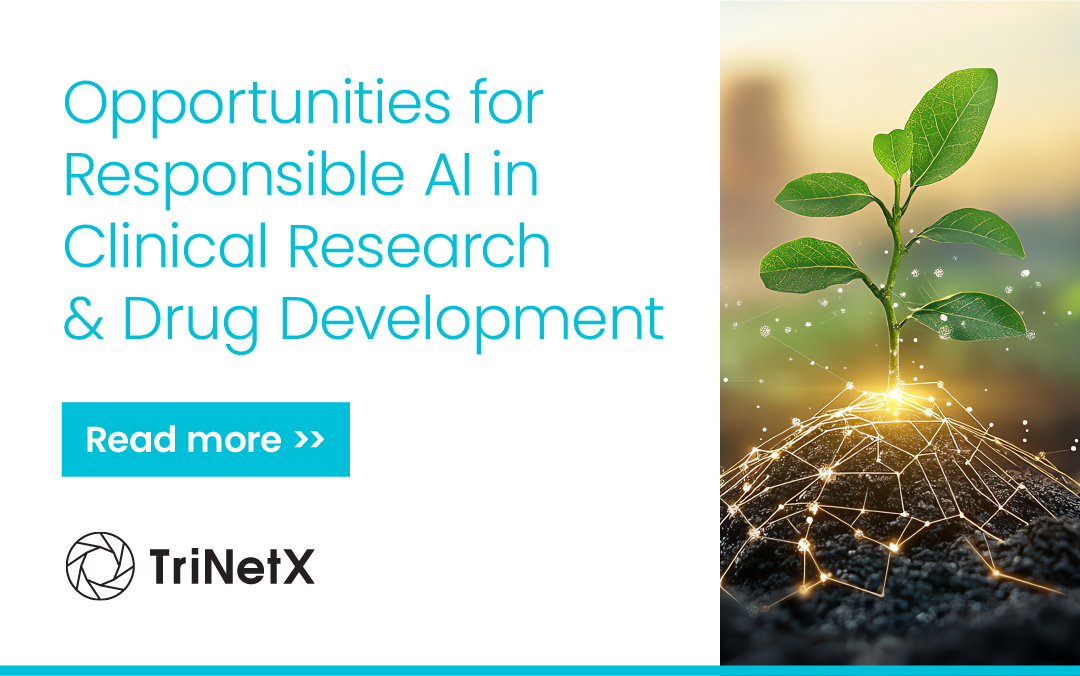Key takeaways:
- AI’s ability to quickly analyze and integrate vast, diverse data, identify patterns, and make accurate predictions presents significant opportunities in clinical research and drug development.
- Advanced analytics, predictive modeling, and machine learning enable biopharma companies to optimize clinical trials, speed up research and development, and bring therapies to patients more efficiently.
- TriNetX’s new eBook, available for download, explores the responsible use of AI in advancing scientific discoveries and how biopharma can harness its potential for the good of healthcare.
In a rapidly evolving healthcare landscape, artificial intelligence (AI) is emerging as a transformative force in drug development and clinical research. With the average cost of bringing a new drug to market soaring to $1.3 billion and a low probability of success, the stakes for innovation have never been higher. Yet, amidst the challenges lies an unparalleled opportunity to leverage AI for better decision-making, improved patient outcomes, and accelerated clinical trials.
TriNetX experts Steve Kundrot, Chief Technology and Solutions Officer and Akiko Shimamura, Senior Vice President, Trial Design and Optimization explore how AI is redefining the paradigms of healthcare innovation in the TriNetX: eBook Artificial Intelligence for the Good of Healthcare: Opportunities for Responsible AI in Clinical Research & Drug Development.
Continue reading for a sneak peek into the eBook; download a full copy here.
The Current State of Drug Development
While the U.S. Food and Drug Administration (FDA) approved 55 new drugs in 2023—a near-record—85% of clinical trials face delays, and 30% of patients drop out of Phase III trials. These inefficiencies translate to daily losses of $600,000 to $1 million for biopharma companies.
Complex trial designs, stringent eligibility criteria, and a lack of diversity exacerbate the difficulties. For example, the FDA now mandates Diversity Action Plans in regulatory submissions, yet companies often struggle to recruit representative patient populations.
AI’s Impact: AI offers a path forward by addressing these challenges through advanced data analytics and predictive modeling. By integrating real-world data (RWD) into the development process, AI can streamline participant recruitment, optimize trial protocols, and enhance diversity.
The Role of RWD: Filling Gaps and Driving Decisions
Randomized controlled trials (RCTs) remain the gold standard for evaluating drug efficacy and safety. However, their tightly controlled environments often fail to reflect the complexities of real-world patient populations.
Here, RWD—sourced from electronic health records (EHRs), claims data, patient registries, and even wearable devices—steps in to complement RCTs. However, challenges such as data fragmentation, inconsistencies, and privacy concerns must be addressed.
AI’s Impact: AI’s ability to harmonize and analyze disparate data sources is critical in unlocking RWD’s potential.
Key AI Use Cases Explored in the eBook
1. Optimizing Clinical Trial Diversity
AI-driven machine learning models can evaluate and enhance the diversity of clinical trial protocols. By analyzing various criteria and their impact on representation, these models ensure inclusivity without compromising scientific rigor.
2. Early Cancer Detection
AI models trained on extensive datasets are revolutionizing early cancer detection. A notable example involves using AI to identify individuals at risk of pancreatic cancer—a condition often overlooked by traditional screening methods. Early intervention enabled by AI significantly improves survival rates.
3. Understanding Disease Progression
AI can analyze patient data to predict disease progression, as demonstrated in a study on follicular lymphoma. By identifying correlations in lab results and treatment pathways, AI can help biopharma companies target the right patient populations and improve therapeutic strategies.
4. Generative AI for Protocol Development
Generative AI is paving the way for novel applications in healthcare. By enabling natural language interactions with RWD, researchers can quickly explore trial inclusion/exclusion criteria and design protocols more efficiently. This “chat with RWD” approach is just one example of how generative AI can help simplify complex processes.
Ensuring Responsible AI: Guardrails for the Future
While AI offers immense potential, its integration into healthcare requires careful navigation. Regulatory frameworks, like the General Data Protection Regulation (GDPR) and Health Insurance Portability and Accountability Act (HIPAA), provide a foundation, but continuous monitoring and adaptation are essential.
To ensure trust and efficacy, organizations must consider:
- Bias Mitigation: Ensuring AI models do not perpetuate disparities in care.
- Clinical Validation: Rigorously testing AI systems in real-world settings.
- Continuous Monitoring: Updating and retraining models as healthcare evolves.
- Transparency: Making AI algorithms explainable and purposeful.
Take the Next Step
The future of healthcare innovation lies at the intersection of data, technology, and responsibility. As evidenced in Artificial Intelligence for the Good of Healthcare: Opportunities for Responsible AI in Clinical Research & Drug Development, AI, when harnessed correctly, can lead to groundbreaking discoveries and improved patient outcomes.
Download the eBook now to stay ahead in this transformative journey and drive meaningful change in healthcare.
About Steve Kundrot
As Chief Technology and Solutions Officer at TriNetX, Steve is responsible for our trial design and optimization (TDO) business unit as well as technology, engineering, data management, platform operations, and cybersecurity across the company. Steve has a BS in Engineering from Cornell University and an MBA from Babson College.
About Akiko Shimamura
Akiko is an experienced leader in the life sciences industry, having held a range of senior roles. As Senior Vice President at TriNetX, she is responsible for developing products and managing teams focused on trial design and optimization. As the former Vice President of Medidata, she has overseen products across real-world evidence (RWE), commercial analytics, and tokenization. Akiko has a wealth of experience in consulting having previously worked at McKinsey & Company where she provided advice to companies on life sciences and analytics.

